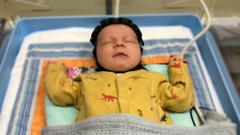A pioneering new device resembling a swimming cap is currently undergoing trials with the potential to significantly enhance the monitoring and care for newborns susceptible to or suffering from brain injuries. This innovative technology aims to provide clinicians with real-time, non-invasive insights into brain function, a critical factor for improving outcomes in this vulnerable population.
Traditional methods of assessing neurological health in infants often present challenges, requiring specialized equipment or being less immediate in their feedback. The advent of this cap-like system represents a significant leap forward, offering a more accessible and continuous way to observe brain activity. Researchers are focusing on how this tool can detect subtle changes in brain function that might indicate distress or injury, enabling medical teams to intervene more swiftly and precisely.
The core benefit lies in its ability to offer continuous, high-fidelity data without causing discomfort to the infant. By gathering comprehensive information on brain performance, the device could help identify babies at risk earlier, tailor treatments more effectively, and ultimately reduce the long-term impact of conditions such as hypoxic-ischemic encephalopathy (HIE) or stroke. The goal is to move towards a more proactive and personalized approach to neonatal neurological care, ensuring that every infant receives the most appropriate and timely support. As trials progress, the hope is that this technology will become a standard tool in neonatal intensive care units globally, fundamentally altering how brain health is managed in the earliest stages of life.



